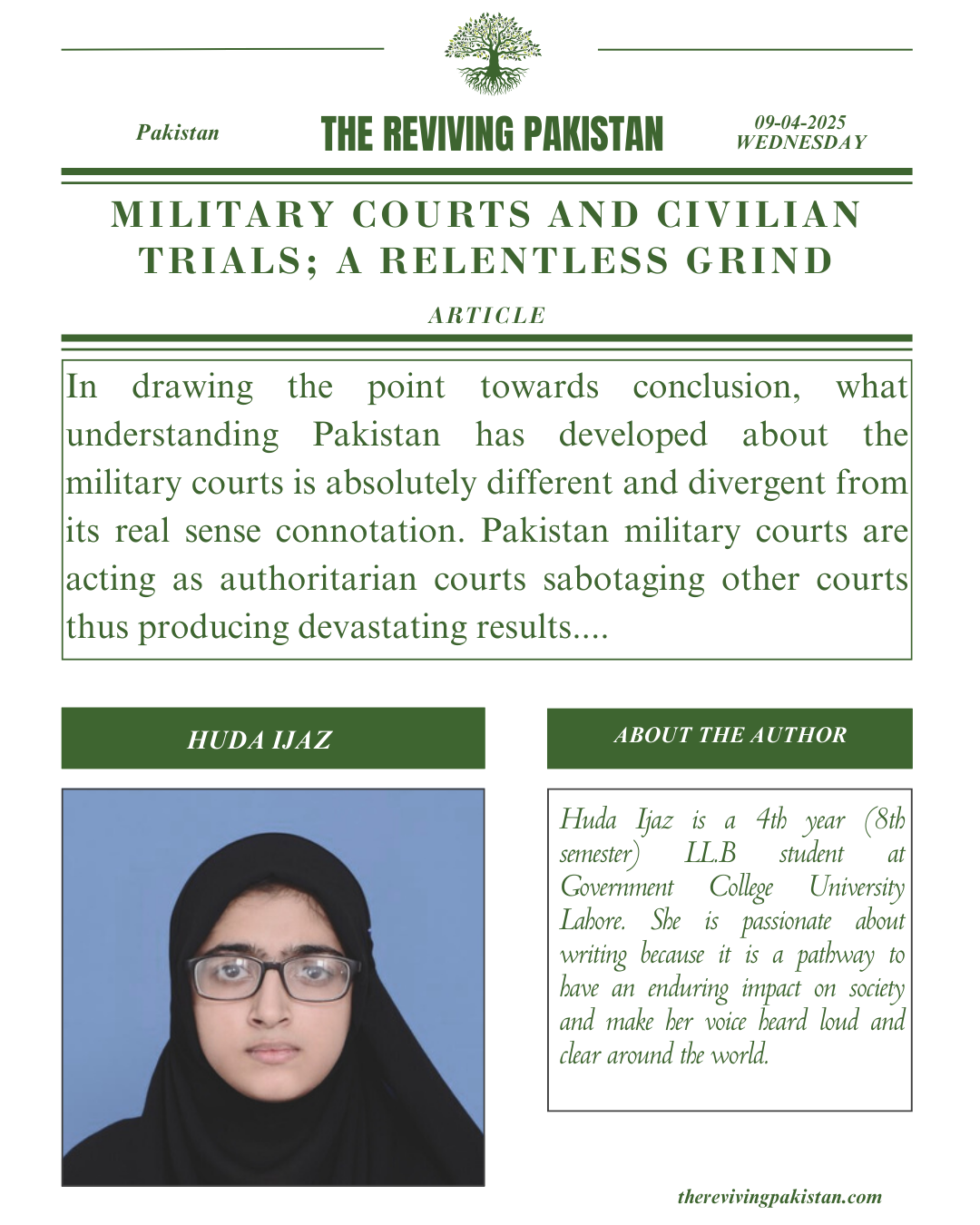
Huda Ijaz
Huda Ijaz is a 4th year (8th semester) LL.B student at Government College University Lahore. She is passionate about writing because it is a pathway to have an enduring impact on society and make her voice heard loud and clear around the world.
“A tale of constant swedge of civilians against military trials, a threat to fundamental rights”
Introduction and Current Status:
The riots conducted on May 9 gained massive importance when a statement was released by DG ISPR on 15 February 2023 to conduct military trials of civilians who were involved in the destruction and demolition of military structures¹. This led to a gargantuan wave of concerns among the masses. This wave was settled by a judgment on 23 October 2023 when a bench of 5 judges decided that the court-martial of civilians is unconstitutional by declaring 2(1)(d) and 59(4) of the Pakistan Army Act, 1952¹’¹ ultra vires (Jawad S. Khawaja vs Federation of Pakistan)². Justice Yahya Afridi was the only one with a dissenting opinion that the court martial of civilians should not be declared unconstitutional and to retain unconstitutionality in this case of the 9 May incident only. This judgment was then challenged by the Federal Government on 17 November, eventually resulting in partial suspension of the verdict on 13 December by the appellate bench.
This partial suspension allowed a court-martial to be conducted as per procedure, but the final verdict was made contingent upon the Supreme Court judgment. The appeal is still pending and civilians are waiting for their fate yet to be decided by the intra court bench (supreme court constitutional bench appeared under 26th amendment)and despite this verdict to military courts to not pass final order, military courts have convicted 25 accused with the punishments ranging from 3 to 10 years stipulating that military courts consider their orders and rules superior to the apex judiciary³. This type of attitude is raising serious concerns among civilians about whether their rights can be secured by this judicial system or not when it comes to the stage where it has to challenge military courts. A glaring example is the present scenario, and it is just disappointment towards the civilian judicial system.
Historical perspective:
A glance back at history shows that military courts can be traced in Roman and Greek civilization, established for just a primary reason_to maintain discipline in the army. So military courts themselves can not be regarded as unconstitutional but the due procedure followed there is questionable. If specifically viewed through the prism of Pakistan’s culture and practice of military courts, a blatant murder of international standards of humanity can be clearly observed. The court-martial of civilians was introduced as an amendment in the Pakistan Army Act,1952⁴ by Ayyub Khan in 1967⁵. In the subsequent years, this amendment led to the conviction of many civilians (Abdul Rashid vs. Federation of Pakistan).
Dissenting opinion:
The civilian trials referred to the army courts are a clear indication that our criminal courts are not up to the standards set up to deliver justice_thus promoting a lack of trust in our own institutions. It is well elaborated in the words of ICJ’s director:
“Extending the tenure of military courts is an attempt to deflect attention from the real issue: the Government’s failure to enact reforms to strengthen the criminal justice system during the four years military courts have been in operation,” Rawski, ICJ’s Asia Director.
As a question of general prudence, can a person unknown to the due process of law deliver justice? This is the same case in the military courts, which are set up by the army personnel and a brigadier who are not even known to the laws of acquittal. The study of the International Commission of Jurists reveals that the conviction rate in Pakistan military courts in the recent past 20 years is 93%_unfathomable situation. This inhumane tradition is still prevalent in the May 9 case. Despite numerous Judgments by the Supreme Court, “That trial without counsel is not regarded as a free and fair trial”⁶, Military courts are still persistent in their previous tradition of conducting the trials on a hasty basis without giving civilians the right to counsel of their own choice. This is a lucid contradiction to its own constitution (Article 10-A of the 1973 constitution of Pakistan).⁷
The military courts are neither unconstitutional nor contrary to the International Human Rights Laws(IHRL), but the question is, is it so in the case of Pakistan? According to Article 14 of ICCPR⁸ to which Pakistan is a signatory, it clearly stipulates that all individuals should be treated equally with a free and fair trial by a competent and impartial tribunal. In the present scenario, military trials in Pakistan can be anything but not free and fair one. This procedure of the military courts to carry out the trial of civilians is undermining the constitutional protection of fundamental rights. Resultantly, this would cause global unrest and concerns about Pakistan, disregarding the international commitments on human rights. In the international standards of human rights, fundamental rights are given due importance but in Pakistan, despite the protection in the constitution and as being a signatory to all human rights conventions, we are still lacking the due protection and disposal of fundamental rights. As in the words of ICJ’s director:
“Military trials of civilians have been a disaster for human rights in Pakistan,” said Frederick Rawski, ICJ’s Asia Director.
Furthermore, this handling of cases to military courts is somewhat brutal murder of the true spirit of separation of powers, a salient feature of Pakistan’s constitution. Such cases like the May 9 incident should be handled by the special tribunals set up by our constitution, like ATC( anti terrorism courts) or criminal courts, rather than putting them into a completely isolated domain irrelevant to law and order.
Concluding Remarks:
In drawing the point towards conclusion, what understanding Pakistan has developed about the military courts is absolutely different and divergent from its real sense connotation. Pakistan military courts are acting as authoritarian courts, sabotaging other courts, thus producing devastating results. The better way forward to keep every institution aligned with the democratic spirit of our constitution, at the very first, Military courts and trials should be specified for military personnel by maintaining the true spirit of separation of power along with the very cases of civilians of grave nature (like high treason). Such amendments in the Pakistan Army Act,1952 should be introduced in line with national interest standards and not with the patronage practices. The ultimate authority of military courts can also be curbed with the standardization of civilian courts(civil and criminal) by free and fair trials, speedy verdicts, and appointment of competent judges. These military courts are detrimental to Pakistan’s global image on the grounds of human rights violations, thus need serious dealing because these contradictions are nothing but a blow to Pakistan’s diplomatic image around the world.
References:
2. https://pakistancode.gov.pk/pdffiles/administrator5a436c410d7fc88fc27dae7b864c6f63.pdf
2. PLD 2024 SC 337
3. https://tribune.com.pk/story/2517420/military-court-sentences-25-for-may-9-riots-ispr
4 Pakistan Army Act 1952
5. (PLD 1975 SC 506)
6.(2012 SCMR 1610)
7. Constitution of Pakistan, Article 10(A)

